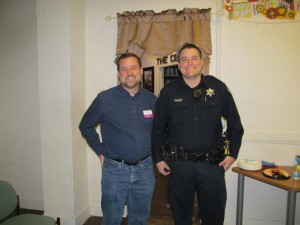In 2012, Boise adopted a citywide ordinance that protects LGBT residents from discrimination in employment, housing, and public accommodations. Eleven other Idaho cities have passed similar ordinances since 2011.
Recently, Boise Police Chief Bill Bones created the department’s–and Idaho’s–first LGBT Liaison Officer for the primary purpose of building trust and communication between the LGBT community and the police department.
In 2015, Dan Lister was appointed the first LGBT Liaison Officer, and in November, Pride Foundation organized an opportunity for the Boise-area LGBT community to meet him.
I recently sat down with Dan and Bill to talk about Dan’s new role and why they felt it was so important.
Steve: Dan, how long have you been a Boise Police Department (BPD) officer and how long have you lived in Boise?
Dan: I had been a Boise Police officer for just over 12 years when I was appointed to the LGBT Liaison position. I have lived in Boise my entire life—38 years. I’ve been married to my wife, Cait, for five years. We have a 13-year-old daughter and a 2-year-old son.
Steve: People will be interested to hear that you’re not part of the LGBT community. What compelled you to step into this LGBT Liaison Officer role?
Dan: My dad was a police officer with BPD for 33 years. I have always remembered how many people he was able to help, not just by doing his job, but by going beyond that. I would see people come up and thank him for something that he did a long time ago and say how the extra time and effort he put in changed their lives. It was important to me to follow in his footsteps by helping others.
Then I saw this opportunity to be the police liaison to the LGBT community, and I considered it a valuable way to promote how I feel about BPD and how patrol officers do their jobs. I remember reading an article in a local publication a few years back stating that members of the LGBT community didn’t feel safe or comfortable going to the police. It was upsetting to read.
My hope is that this position will enable me to get the message out that we serve and protect all of the citizens of Boise, including LGBT people. I have friends and family members who are part of the LGBT community, and I know that I would want them to feel like the police are there for them, and I see this as an opportunity to uphold that ideal.
Steve: What else do you hope this position will accomplish? Why was it created?
Dan: I hope that it will be able to break down barriers and preconceived ideas that both sides have of each other. I’m not just here as an asset for the LGBT community. I’m also here as a resource for fellow officers if they have questions or concerns about how to deal with different situations they may face.
Steve: Given the fragile relationship that has historically existed between the police and the LGBT community, what else is BPD proactively doing, or going to be doing, to strengthen the relationship between police and the LGBT community in Boise?
Bill: The past relationship between police and our LGBT community has been broken across America; and, unfortunately, remains broken in many areas. The relationship in Boise is fragile and in the early stages of forming not only a positive relationship but moving towards successful partnerships. Both myself and (former chief) Mike Masterson have taken public stands on not only local protections for our LGBT community, but on state legislation, and I will continue to do so.
We close every police academy class with a day at the Anne Frank Memorial in Boise, where we talk about the role of law enforcement in protecting human rights. We specifically invite representatives of our LGBT community to speak, realizing this is an area where law enforcement has had failures to protect such rights.
Steve: Even with a citywide non-discrimination ordinance in place protecting LGBT people in Boise, there will likely still be fear and uncertainty from the LGBT community around reporting an act of discrimination, trust issues with police, lack of knowledge about one’s rights if an incident occurs—that sort of thing. How do we change that?
Dan: The only way to break down the barriers is by reaching out and opening lines of communication. The BPD has made a strong step forward in doing that with the creation of this position. We are seeking to make sure that people don’t get victimized twice—first by the crime and then again by not being able to go to the police.
Bill: We in law enforcement have a long way to go in earning the trust of our LGBT community and nurturing the growing partnerships we have to create better service. The Boise Police Department is committed to the long haul and ensuring we become a leader in providing the protection of the innate human rights of every individual.
Dan encourages anyone in the Boise LGBT community to reach out to him to report a crime or learn more about their rights under the city’s non-discrimination ordinance. Email him at dlister@cityofboise.org.
Steve Martin is the Regional Development Organizer in Idaho. Email Steve.
